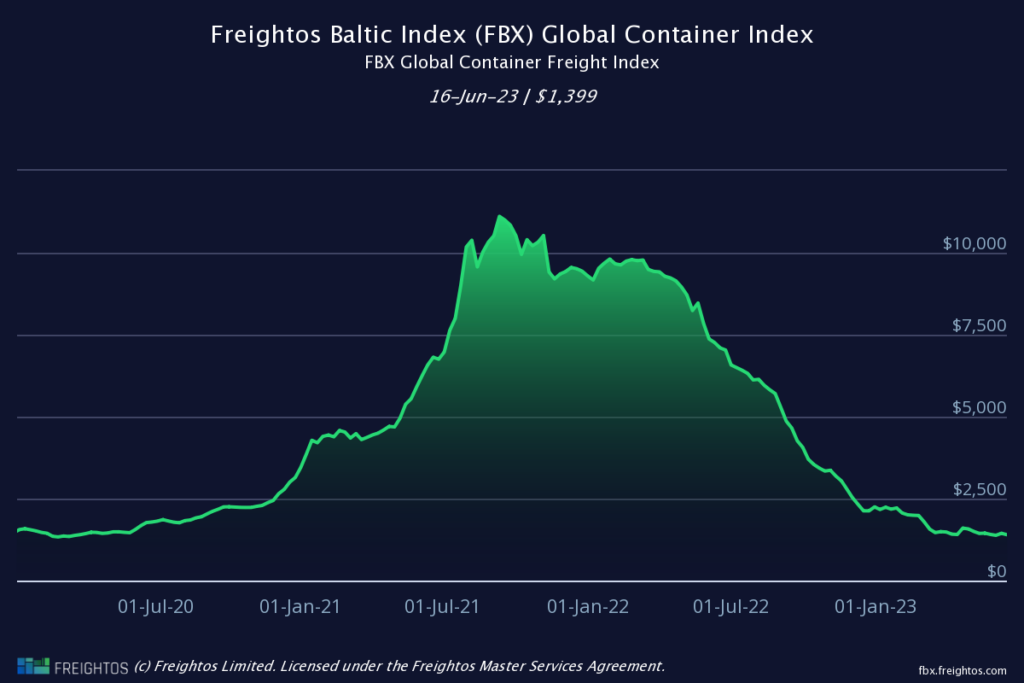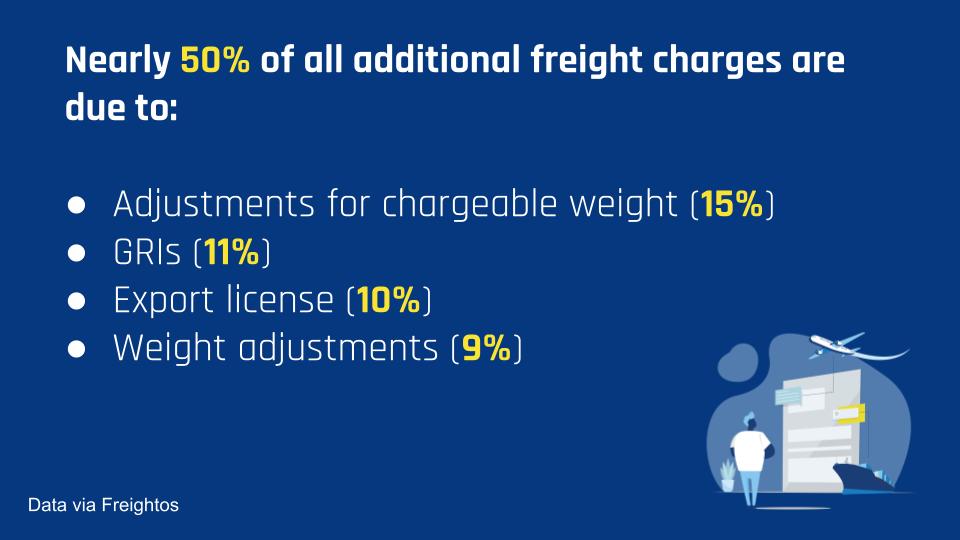When it comes to global freight, freight forwarders have seen it all. That’s why they’re uniquely positioned to give advice about what works and what doesn’t when moving goods around the world.
To make sure you don’t miss out on this must-know info, we’ve pulled together some of the best tips from Freightos.com freight forwarders. Take a look to learn how to save time and money, and optimize your entire supply chain.

Looking for quotes from vetted freight forwarders?
Tip #1: Be flexible with your shipping route and mode
Freight shipping conditions can change quickly – weather conditions, port congestion, and unexpected global events can all throw a wrench in your carefully planned supply chain. However, anticipating changes – and building flexibility into your operations – allows you to adapt to whatever comes up. Charles Marrale, CEO of Ex Freight, explains that if you face obstacles to planning your shipment with your regular mode, route, and delivery, you can try alternatives:
- Try a different route. Peak season or unexpected events may reduce capacity on your regular shipping lane or increase congestion at the port. In such cases, select a different route or delivery port. It may mean adjusting land transportation, but when you face backups, a longer route may actually be faster and cheaper.
- Experiment with a different mode, or combine modes. For instance, if you usually ship FCL but container space faces capacity shortages, try LCL, or a combination of LCL and air. Your freight forwarder can help you put together a plan that maximizes your options.
Read more of Charles’s advice here
Tip #2: Take busy seasons into account
Martin Bland, owner at Global Freight Management, urges importers and exporters to check the calendars of their origin and destination countries while planning supply chains. That’s because major holidays can disrupt shipping operations. For example, the Lunar New Year often brings operations to a halt at many Asian ports, which means importers and exporters need to adjust, usually by shipping in advance of the holiday.
It’s important to be aware of major busy seasons such as peak season, which typically starts in July for ocean freight and October for air, when capacity is constrained and prices escalate. Since the start of COVID-19, peak season has been erratic, and shippers have faced other disruptions such as shutdowns and port congestion. Stay on top of freight price trends with the Freightos Baltic Index.

Freight prices have seen unprecedented highs these past few years, but have largely returned to normal
Tip #3: Get clarity on incoterms ASAP
Incoterms are not all created equal, so it’s important to be clear about which one you want to use. According to Martin Moyano, managing director of Clarke Global Logistics, this is a critical step to be taken early on in the shipping process. Having upfront clarity on who is responsible for what makes for a smoother process.
Tip #4: Don’t book your shipment until your goods have been packed
David Kadish, director of operations at Primorus, highlights the benefits of waiting until your goods are packed to book a shipment. Firstly, if your goods are ready to go by the time you book your shipment, you’ll avoid last-minute scrambling to meet deadlines.
Secondly, having your goods packed before you book allows for accurate measurement of your shipment, including the packaging. Precise dimensions are crucial because when freight forwarders pick up a shipment with dimensions that differ from what appears on the booking, they’ll have to remeasure and sometimes even repack the goods, which results in additional costs.
A crucial aspect of accurate measurement is taking chargeable weight into account. Chargeable weight incorporates both weight and volume, since vessels can’t charge the same amount for items of equal volume with very different weight, or items of different weight with very different volume.
Learn more about chargeable weight and calculate yours here. But, if you book on Freightos.com, we’ll calculate your chargeable weight for you.

Tip #5: Ask your forwarder questions
There are a lot of details that go into a shipment, from the actual work of moving the goods to coordinating with different providers, handling paperwork, compliances, and dealing with 3PLs. Your forwarder is a valuable resource, so be sure to ask them if you need clarity on any part of the shipping process. Martin Bland underscores this point, noting that forwarders are there precisely to assist with these matters. By asking questions, you minimize the likelihood of making errors, and, in turn, your forwarder is better equipped to provide the best service.
Tip #6: Remember to include taxes and fees in your freight cost calculations
When calculating your freight budget, make sure to include the costs beyond the actual freight. These include taxes, fees, insurance, and any special services. Martin Bland frequently sees people forget to include these charges in their freight budget, and stresses that considering them upfront will allow for better supply chain cost management as it helps prevent unexpected expenses later on.
Tip #7: Ask your forwarder about trade agreements
One way your forwarder can help you out is with their expertise on the regulations of your goods’ countries of origin and destination. Martin Moyano of Clarke suggests specifically asking your forwarder if there are any trade agreements between these two countries that could reduce entry costs. Even better, ask about this before finalizing your origin and destination, or if you’re considering expanding to new locations.
Tip #8: Don’t forget extra licensing
Shipping certain items, like copyrighted materials, food items, or cosmetics, often requires additional licensing and compliances for your goods to clear customs. Martin Bland explains that these forms usually need to be submitted in advance, so ask your forwarder what your goods might need to avoid compliance-related delays and fees.

Tip #9: Watch out for expired Amazon FBA labels
Delays are always a hassle, but there’s a particular pitfall Amazon FBA shippers need to look out for if goods get held up: expired FBA labels. Miranda Qin at Seabay Logistics emphasizes the importance of keeping labels current to ensure goods are accepted at FBA warehouses.
Amazon labels expire because when you book an FBA shipment, you need to create a shipping plan for the shipment in the Amazon Seller Central portal – and these expire after 90 days.
So, what happens if your FBA labels expire before reaching the warehouse? Sometimes Amazon will forgive the delay if you reach out and explain the situation. Alternatively, you can create a new shipment in Seller Central and ask your forwarder to relabel your goods when they arrive at the destination port before they’re dispatched to the Amazon warehouse.
Tip #10: Treat your relationship with your forwarder as a partnership.
When you’re working with a good forwarder, it can be tempting to sit back and assume they will handle everything. But Robert Khachatryan, CEO of Freight Right, explains that that’s a missed opportunity. By actively collaborating with your forwarder, you’ll likely achieve better results. Here’s how:
- Communicate your needs upfront. Investing time in detailing exactly what type of goods you’re shipping, the necessary documentation, specific tracking needs, compliance forms, special handling, and warehouse operations, will set your freight forwarder up to provide outstanding service and avoid last-minute snags.
- Work on supply chain optimization. While freight forwarders keep your goods moving, importers and exporters can also help the process. For example, when choosing a warehouse provider, Robert advises prioritizing flexibility in delivery hours. A warehouse that operates for longer hours not only helps avoid storage fees for late deliveries, it also allows you to work more seamlessly with your forwarder to adapt to last-minute changes. If you take care of that, your forwarder can do a better job, potentially saving you additional charges.
Read more of Robert’s advice here


